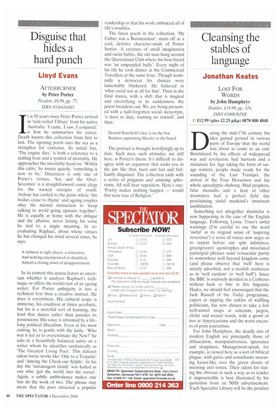Cleansing the stables of language
Jonathan Keates
LOST FOR
WORDS by John Humphrys Hodder, £14.99, pp. 334, ISBN 034083658X £12.99 (plus £2.25 p&p) 0870 800 4848 During the mid-17th century the idea gained ground in various parts of Europe that the world was about to come to an end. Bewildered by the effects of widespread war and revolution, bad harvests and a miniature Ice Age taking the form of savage winters, people made ready for the sounding of the Last Trumpet, the arrival of the Four Horsemen and the whole apocalyptic shebang. Mad prophets, false messiahs and a host of other doomsters had a perfect field day proclaiming sinful mankind's imminent annihilation.
Something not altogether dissimilar is now happening in the case of the English language. Following Lynne Truss's awful warnings (I'm careful to use the word `awful' in its original sense of `inspiring reverence') a score of voices now urges us to repent before our split infinitives, greengrocers' apostrophes and misrelated participial phrases send vernacular purity to somewhere well beyond kingdom come (and please observe that `well' here is strictly adverbial, not a modish reinforcer as in 'well random' or `well buff). Since the BBC is routinely derided as a Cerberus without bark or bite in this linguistic Hades, we should feel encouraged that the Jack Russell of the Today programme, expert at nipping the ankles of waffling politicians, has now chosen to take a few well-aimed snaps at solecism, jargon, cliche and weasel words, with a growl or two at Americanisms and the worst excesses of print journalism.
For John Humphrys, the deadly sins of modern English are principally those of obfuscation, manipulativeness, ignorance and sloppiness. Management-speak, for example, is viewed here as a sort of biblical plague, with gurus and consultants swarming locust-like over the green shoots of meaning and syntax. Their talent for stating the obvious in such a way as to render it impenetrable is best illustrated by his quotation from an NHS advertisement: 'Each Specialist Library will be the product of a community of practice of all those interested in knowledge mobilization and localization in their domain.' Yet, as Humphrys reminds us, professional wordsmiths such as academics and reviewers are scarcely any more lucid or plaindealing. Tracy Fmin's frowzy, smelly bed became validated as an art work by the hyperbole of those who wrote in its praise. Accolades such as 'an undeodorised song of poetic extremity' went further than the noisome object itself in demanding our uncritical reverence.
This habit of treating the reader as a more than usually oafish species of rabbit dazzled by the car headlights of gobbledygook is an unwelcome import from across the Atlantic. Humphrys isn't, thank goodness, rootedly anti-American, ready as he is to praise the national habit of crapcutting incisiveness characterising everybody from aspiring presidents to colonels on their way to Fallujah. He deals mercilessly, however, with the pervasive influence of long-running TV series like Friends and BuffY the Vampire Slayer, for all their vigour of discourse, in widening the expressive gulf between old and young on this side of the pond. Usages such as 'I'm like', this has got to be', I'm good' and the nowadays endemic pseudo-interrogative upward slide at the end of the sentence are identified as the not so thin end of a most dubious linguistic wedge.
A veritable New-gate Calendar of verbal malfeasance turns Humphrys into Harrumphrys. The obsession with targets and keystages currently garrotting modern education is seen for the infernal machine that it is, a Celtic lament goes up for the disappearance of prepositions and reflexives, while his music-lover's rage is nobly stirred by the ludicrous rebranding of the Lindsay String Quartet as the Lindsays'.
The new name made them sound like a lowbudget American soap opera imported to fill a backwater slot in daytime television when what they really do is play late Beethoven sublimely.
It is always exhilarating to read a book which says what so many of us think but haven't the necessary celebrity clout to hammer home. The writer is not uncritical of the BBC, hut defends its claim to reflect the changing nature of language. His heftiest brickbats are reserved, predictably, for politicians, but while John Reid, David Milihand and a score of lesser ministerial johsworths totter under the onslaught, so too do the delphie Donald Rumsfeld ('we also know there are known unknowns') and his fellow neo-cons with their 'rogue states', 'war on terror' etc. That grand panjandrum of verbal manipulators Alastair Campbell complained more than once to the Corporation about something he called 'the John Humphrys problem'. Not the least comforting aspect of Lost for Words is that this remains triumphantly unsolved.



















































































 Previous page
Previous page